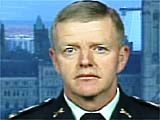Canada to send 150 peacekeepers to Sudan: report
OTTAWA, May 7, 2005 (CP) — Canada will send up to 150 military personnel to Sudan to help the African Union and a United Nations mission keep the peace in the war-torn African country, The Canadian Press has learned.
 Ottawa will also shore up its support for the African mission by handing over some old military equipment and likely adding to the $20 million in humanitarian support it has already given to Sudan, a source said.
Ottawa will also shore up its support for the African mission by handing over some old military equipment and likely adding to the $20 million in humanitarian support it has already given to Sudan, a source said.
But whether the announcement — expected within days, and which could also include diplomatic efforts — is enough to assuage independent MP David Kilgour remains to be seen.
Kilgour has said Canada’s response to Sudan will be a major factor in his decision to lend his critical support to the minority government in a confidence vote expected May 18.
The government announcement will not include a major military force, said the source, who spoke on condition of anonymity. Rather, the troops involved will act as short-term advisers, mechanics, trainers and planning staff.
“We’re looking at a suite of different options, including giving them some pretty substantial pieces of equipment,” said the highly placed Defence Department source. “This isn’t just a defence package.
“What is not on that menu of options is a large-scale deployment of troops on the ground in the actual affected area.”
Canada has already committed 31 soldiers to act as advisers to the African Union mission based in Addis Ababa, Ethiopia, which is responsible for the hard-hit Darfur region, and the UN Standing High-Readiness Brigade in Khartoum.
Ottawa will increase that commitment “by a factor of five or less,” said the source. The exact number will depend on what the forces in-theatre say they need.
Ottawa has also leased helicopters for the African Union force. It is now contemplating other transportation options Canada no longer requires, including surplus vehicles “with some protection” — not Iltis jeeps.
Western nations have been urging the Khartoum-based government to halt attacks by government-aligned Arab militias. The militias launched a counter-insurgency campaign in 2003 against ethnic African rebels.
The rebels began their fight over what they view as discrimination by the Arab-dominated government.
Known as the Janjaweed, the militias have committed wide-scale abuses against tribes they say are allied with the rebels.
The two-year conflict in Darfur has left at least 180,000 people dead, many through disease and hunger, and has displaced more than two million people, says the UN.
In an interview Friday, Kilgour suggested he’s willing to help topple the government if he disapproves of its military policy.
He reacted strongly to remarks by Defence Minister Bill Graham, who has said Canada “cannot invade Sudan.”
“It requires United Nations action,” Graham said. “It requires co-ordination with the African Union. It requires political as well as military and aid matters.”
Kilgour called Graham’s comments “fear-mongering.”
“I don’t think (it) becomes him or becomes the office, or is at all helpful at a time when 4,000 people a week are being murdered or raped,” Kilgour said.
“To me it’s grossly irresponsible for a defence minister to be saying that. If he thinks he’s going to win friends and influence people by that kind of statement — including in a (confidence) vote next Thursday — he’s sadly wrong.”
In a recent meeting with Prime Minister Paul Martin, Kilgour said he requested boots on the ground in Sudan, plus equipment like helicopters, food, medicine and money. He also wants Canada to boost its foreign aid to get it closer to 0.7 per cent of the gross domestic product.
“There was clearly an understanding that a major initiative would be undertaken by Canada, both militarily and in terms of aid for Darfur.”
Kilgour says the situation requires a multilateral force — probably NATO. But the African Union has clearly stated it does not want or need such a force, Graham said.
“We’d have to go in, in combination with the African Union,” said Kilgour.
“Logistical support is required — all kinds of things that Canada and all kinds of countries could use to stop the slaughter, in partnership with the African Union.”
Justin Laku, an Ottawa resident, said he recently toured displaced-persons camps in Darfur and saw victims of ritualistic rape first-hand. He said he knows of camps where refugees are being murdered by militiamen.
“The Janjaweed comes in and rounds up women every night,” Laku said in an interview. “They round them up, they rape them and they leave them there.
“They (the African Union) say: ‘We can only document their crimes but we cannot fight back. We cannot protect because we don’t have money.”‘
Kilgour said he’d likely issue a news release an hour or two before the crucial Commons vote saying which way he’ll go.
He said right now he’s “dead-centre” on the issue.
